Get the latest financial news, insights and expert analysis from our award-winning MoneyWeek team, to help you understand what really matters when it comes to your finances.
You are now subscribed
Your newsletter sign-up was successful
Want to add more newsletters?

Twice daily
MoneyWeek
Get the latest financial news, insights and expert analysis from our award-winning MoneyWeek team, to help you understand what really matters when it comes to your finances.

Four times a week
Look After My Bills
Sign up to our free money-saving newsletter, filled with the latest news and expert advice to help you find the best tips and deals for managing your bills. Start saving today!
Welcome back.
This week’s cover has the omicron variant of Covid ruining everyone’s Christmas. Hopefully, it won’t come to that, of course. As Alex Rankine says, the new variant is a cause for concern, but it’s not a cause for panic – though markets certainly took its appearance as a sign to overreact a little. We look at just how serious things really are, and explain what it might mean for your money.
Our main investment feature this week is on renewable energy. Fossil fuels are on their way out (though, as we keep telling you, they’ll be around for quite some time yet, so don’t write them off). But in the longer term, renewable energy is the way to go. That’s opened up plenty of opportunities for investors, and Matthew Partridge picks some of the best.
MoneyWeek
Subscribe to MoneyWeek today and get your first six magazine issues absolutely FREE

Sign up to Money Morning
Don't miss the latest investment and personal finances news, market analysis, plus money-saving tips with our free twice-daily newsletter
Don't miss the latest investment and personal finances news, market analysis, plus money-saving tips with our free twice-daily newsletter
If you’re not already a subscriber, sign up here and get your first six issues free.
This week’s podcast features Ewan Markson-Brown. Ewan spent many years at Baillie Gifford running some extremely successful Pacific-focused funds, but recently moved to Crux Asset Management, where he’s moving down the market-cap scale to concentrate on smaller companies. Find out why, and what he’s buying now, here.
Here are the links for this week’s editions of Money Morning and other web articles you may have missed:
- Monday Money Morning: Coronavirus has had less of an impact on UK property than you might think
- Tuesday Money Morning: What the Omicron variant means for your money
- Merryn’s blog: Why the “capital cycle” is so important for investors to understand
- Wednesday Money Morning: It’s official – inflation is no longer transitory
- Thursday Money Morning: Is the bull market over, or is this a short-term pullback?
- Web article: Law Debenture investment trust gets a boost from hydrogen
- Friday Money Morning: Could the oil price hit $150 a barrel by 2023?
- Cryptocurrency roundup: Facebook U-turns on crypto-ad ban
Now for the charts of the week. Gold doesn’t seem to be much of a safe haven right now, selling off in tandem with wider markets.
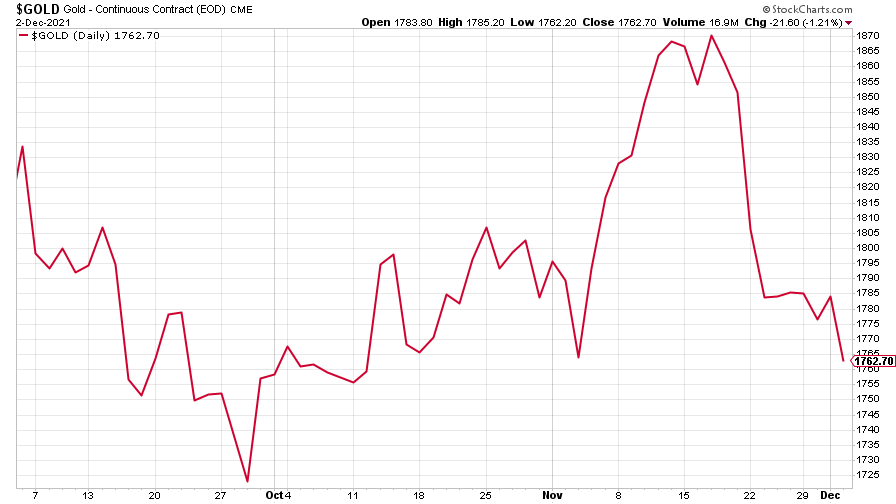
(Gold: three months)
The US dollar index (DXY – a measure of the strength of the dollar against a basket of the currencies of its major trading partners) fell back, too.
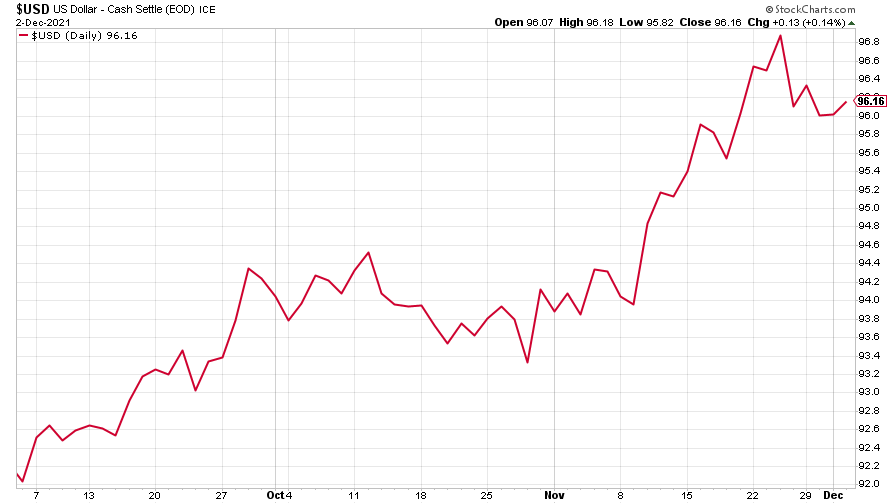
(DXY: three months)
The Chinese yuan (or renminbi) strengthened a little against the greenback (when the red line is rising, the dollar is strengthening while the yuan is weakening).
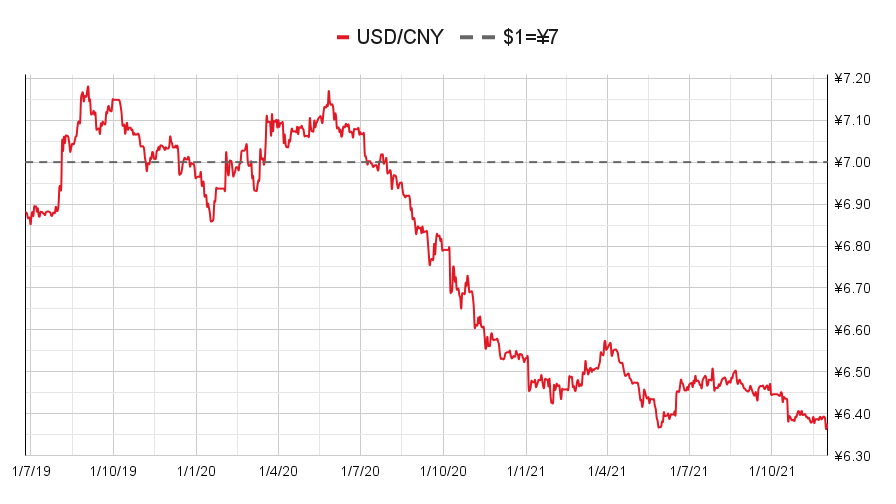
(Chinese yuan to the US dollar: since 25 Jun 2019)
The yield on the ten-year US government bond saw a big fall despite the Federal Reserve’s more hawkish stance on inflation.
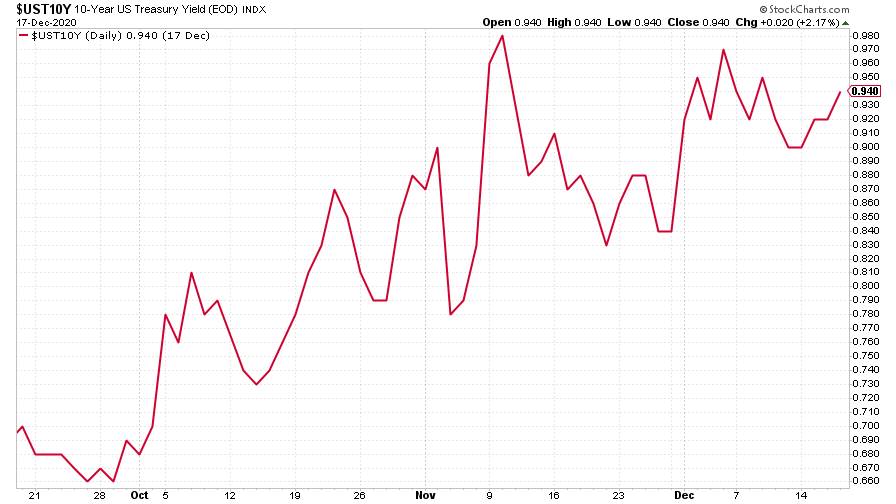
(Ten-year US Treasury yield: three months)
The yield on the Japanese ten-year bond fell, too - though perked up towards the end of the week.
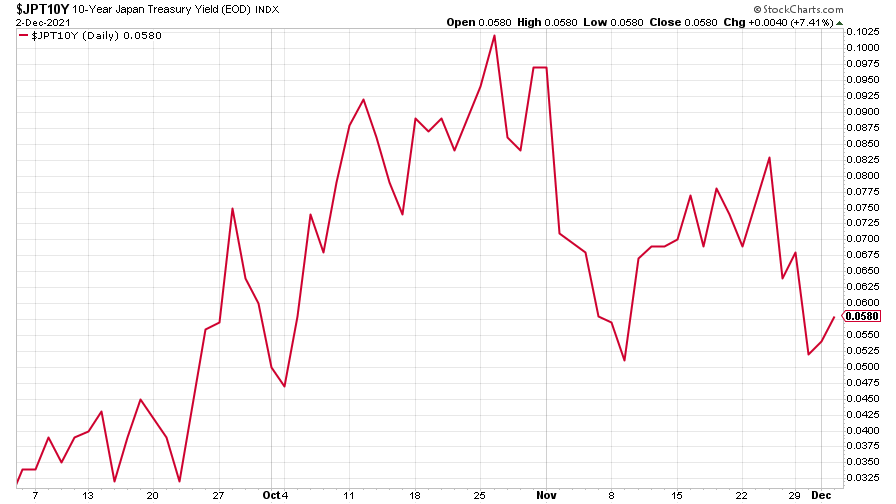
(Ten-year Japanese government bond yield: three months)
And the yield on the ten-year German Bund slid further.
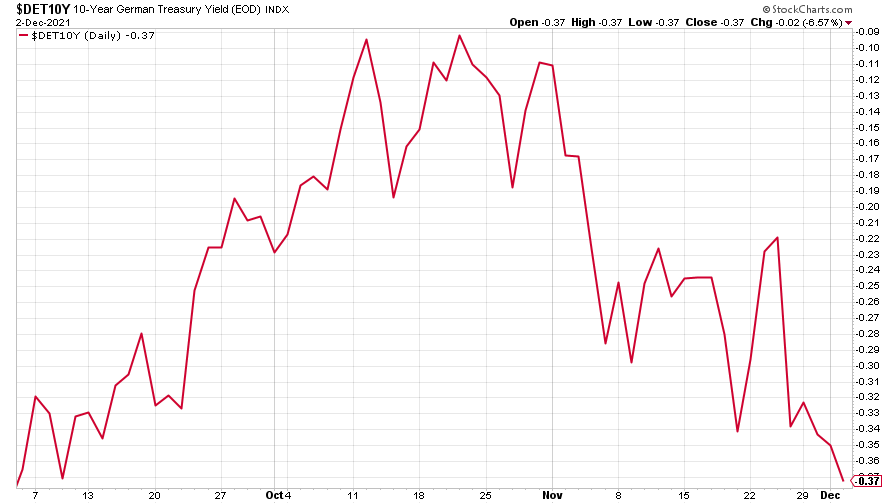
(Ten-year Bund yield: three months)
Copper continued its erratic journey sideways.
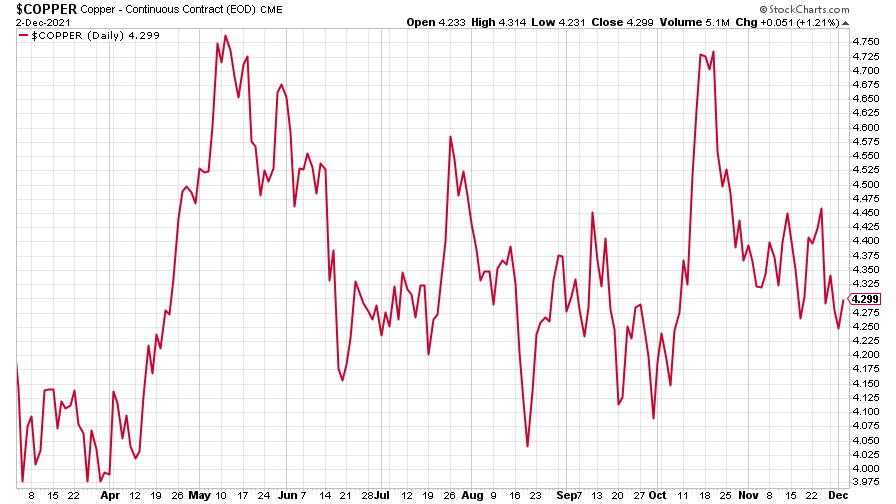
(Copper: nine months)
And the closely-related Aussie dollar fell hard against the US dollar.
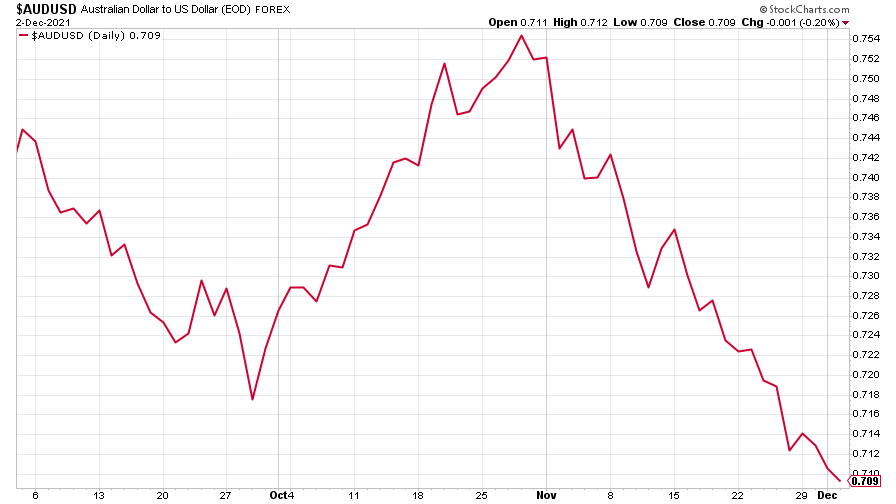
(Aussie dollar vs US dollar exchange rate: three months)
Bitcoin fell slightly, but saw little real action.
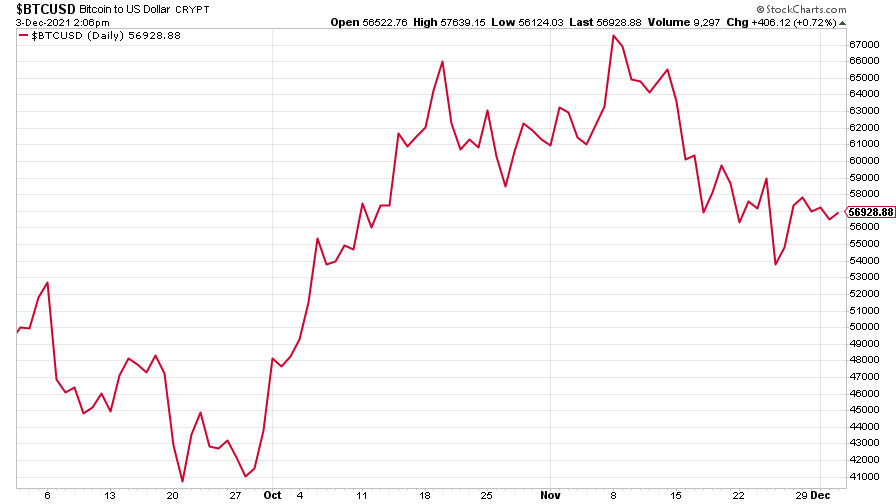
(Bitcoin: three months)
US weekly initial jobless claims rose by 28,000 to 222,000; the four-week moving average fell by 12,250 to 238,750, its lowest since 14 March 2020.
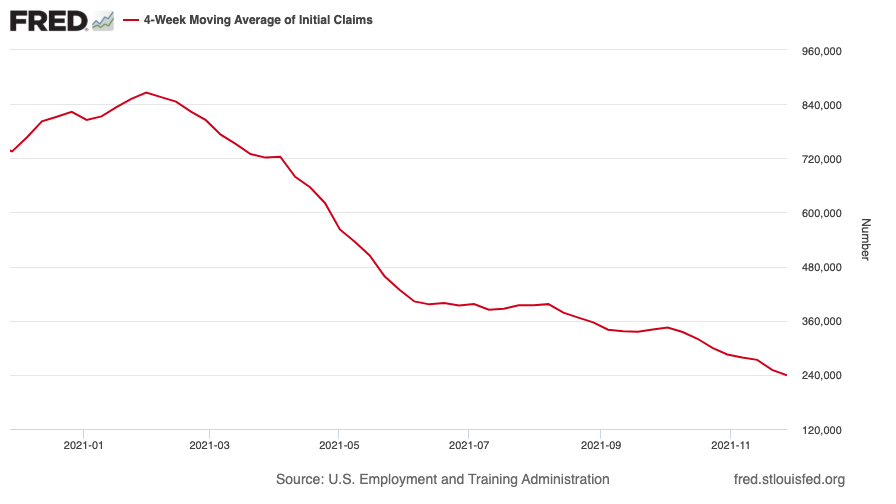
(US initial jobless claims, four-week moving average: since Jan 2020)
The oil price saw a big fall after omicron’s emergence threatened to bring restrictions back to much of the world. But in the long run, as John noted this week, the long-term picture looks rather more optimistic.
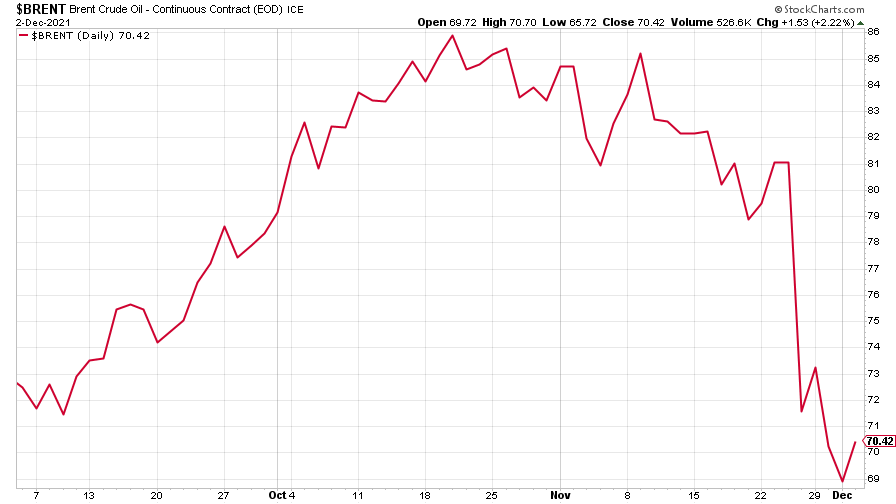
(Brent crude oil: three months)
Amazon's share price sold off.
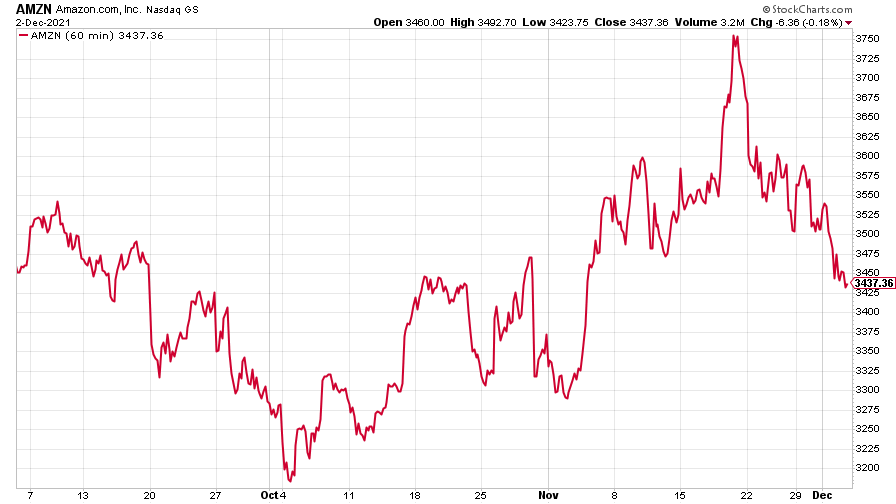
(Amazon: three months)
While Tesla slipped, too.
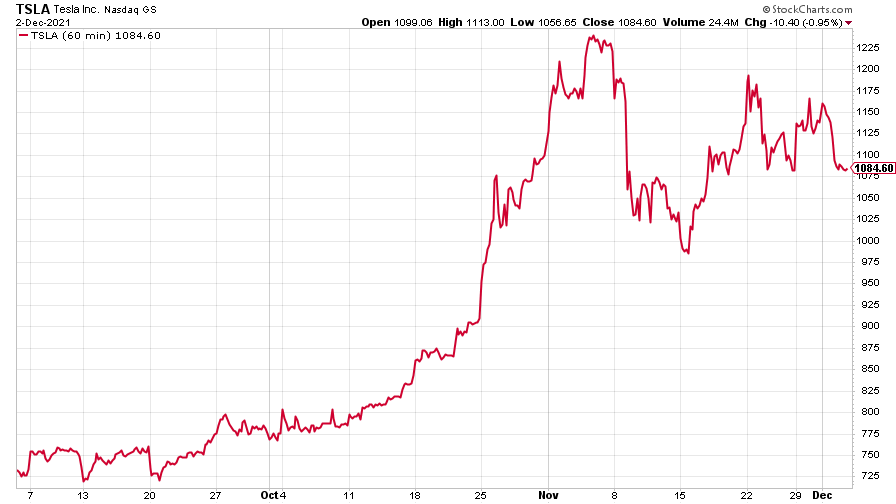
(Tesla: three months)
Have a great weekend.
Get the latest financial news, insights and expert analysis from our award-winning MoneyWeek team, to help you understand what really matters when it comes to your finances.

-
 Should you buy an active ETF?
Should you buy an active ETF?ETFs are often mischaracterised as passive products, but they can be a convenient way to add active management to your portfolio
-
 Power up your pension before 5 April – easy ways to save before the tax year end
Power up your pension before 5 April – easy ways to save before the tax year endWith the end of the tax year looming, pension savers currently have a window to review and maximise what’s going into their retirement funds – we look at how
-
 UK wages grow at a record pace
UK wages grow at a record paceThe latest UK wages data will add pressure on the BoE to push interest rates even higher.
-
 Trapped in a time of zombie government
Trapped in a time of zombie governmentIt’s not just companies that are eking out an existence, says Max King. The state is in the twilight zone too.
-
 America is in deep denial over debt
America is in deep denial over debtThe downgrade in America’s credit rating was much criticised by the US government, says Alex Rankine. But was it a long time coming?
-
 UK economy avoids stagnation with surprise growth
UK economy avoids stagnation with surprise growthGross domestic product increased by 0.2% in the second quarter and by 0.5% in June
-
 Bank of England raises interest rates to 5.25%
Bank of England raises interest rates to 5.25%The Bank has hiked rates from 5% to 5.25%, marking the 14th increase in a row. We explain what it means for savers and homeowners - and whether more rate rises are on the horizon
-
 UK inflation remains at 8.7% ‒ what it means for your money
UK inflation remains at 8.7% ‒ what it means for your moneyInflation was unmoved at 8.7% in the 12 months to May. What does this ‘sticky’ rate of inflation mean for your money?
-
 Would a food price cap actually work?
Would a food price cap actually work?Analysis The government is discussing plans to cap the prices of essentials. But could this intervention do more harm than good?
-
 Is my pay keeping up with inflation?
Is my pay keeping up with inflation?Analysis High inflation means take home pay is being eroded in real terms. An online calculator reveals the pay rise you need to match the rising cost of living - and how much worse off you are without it.
